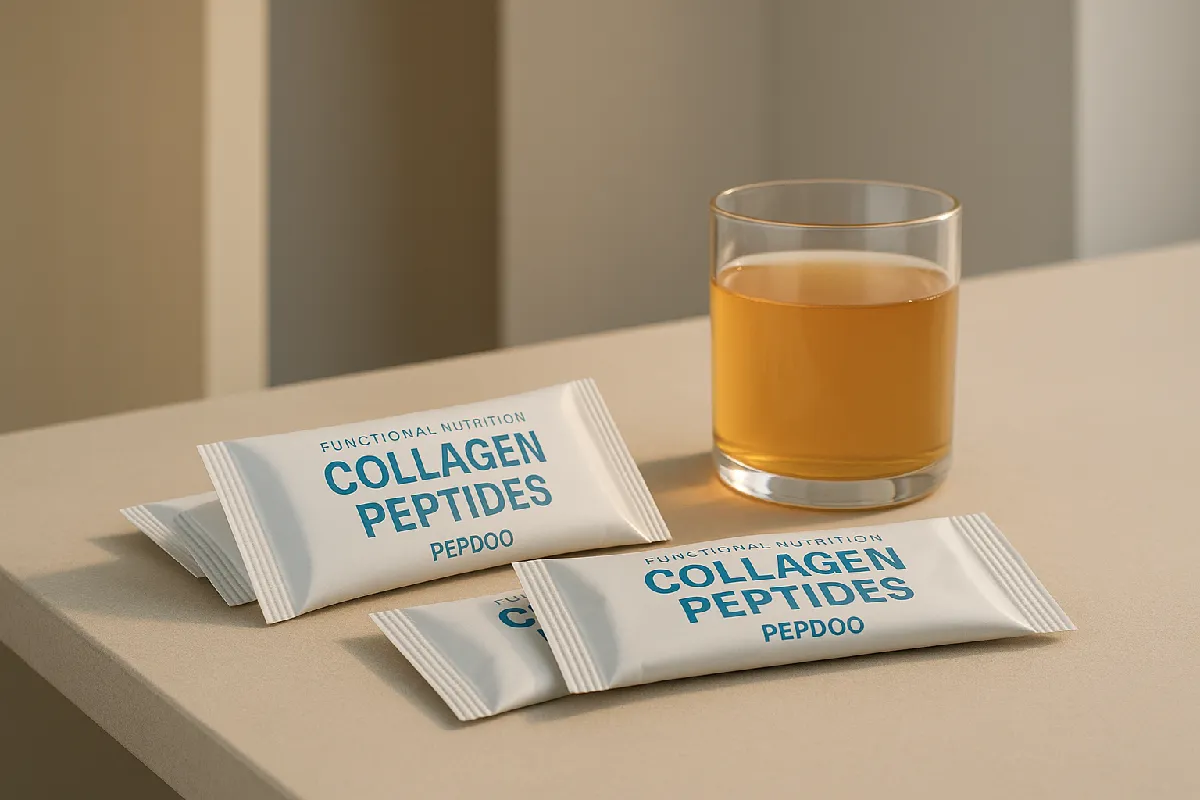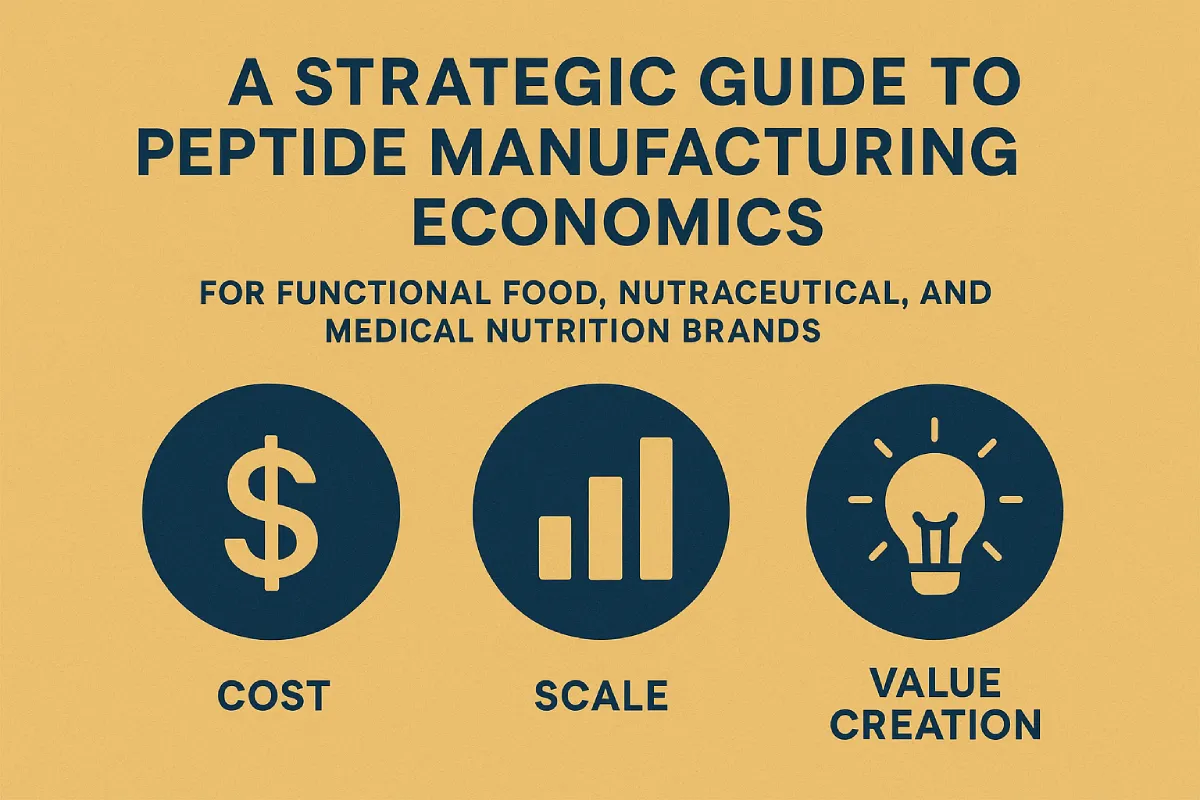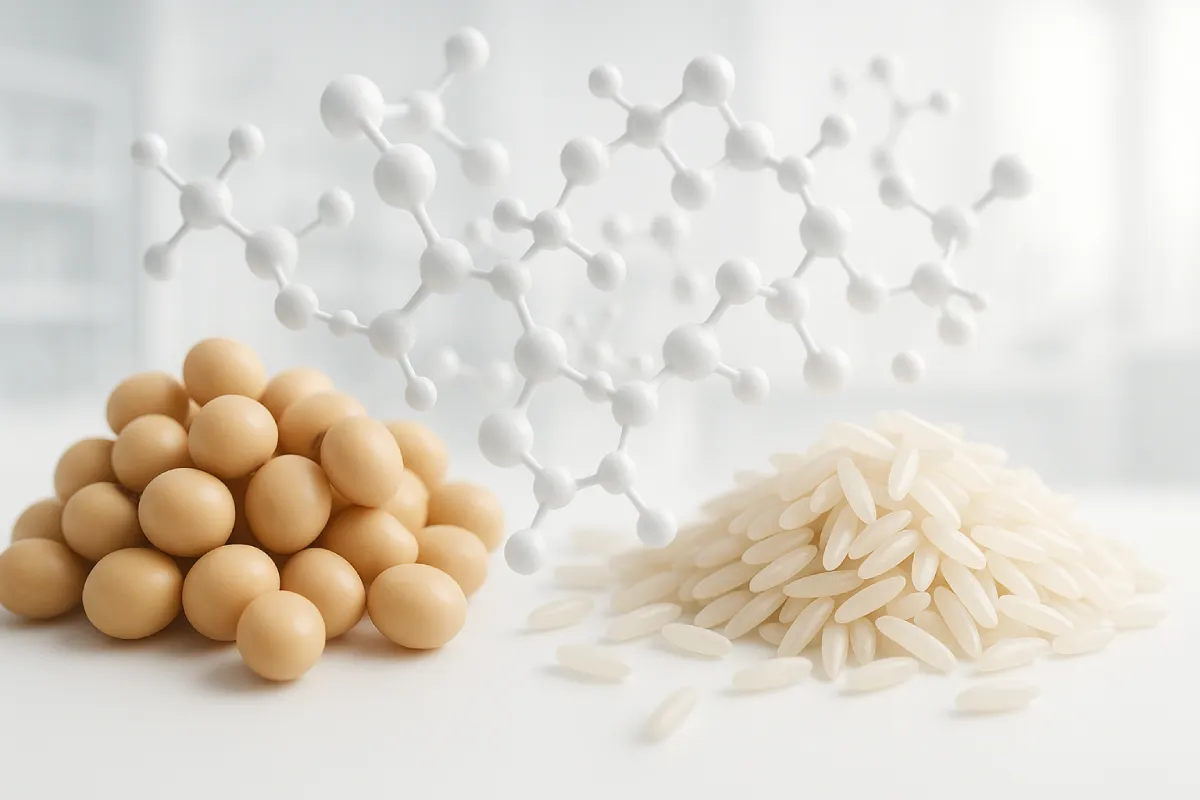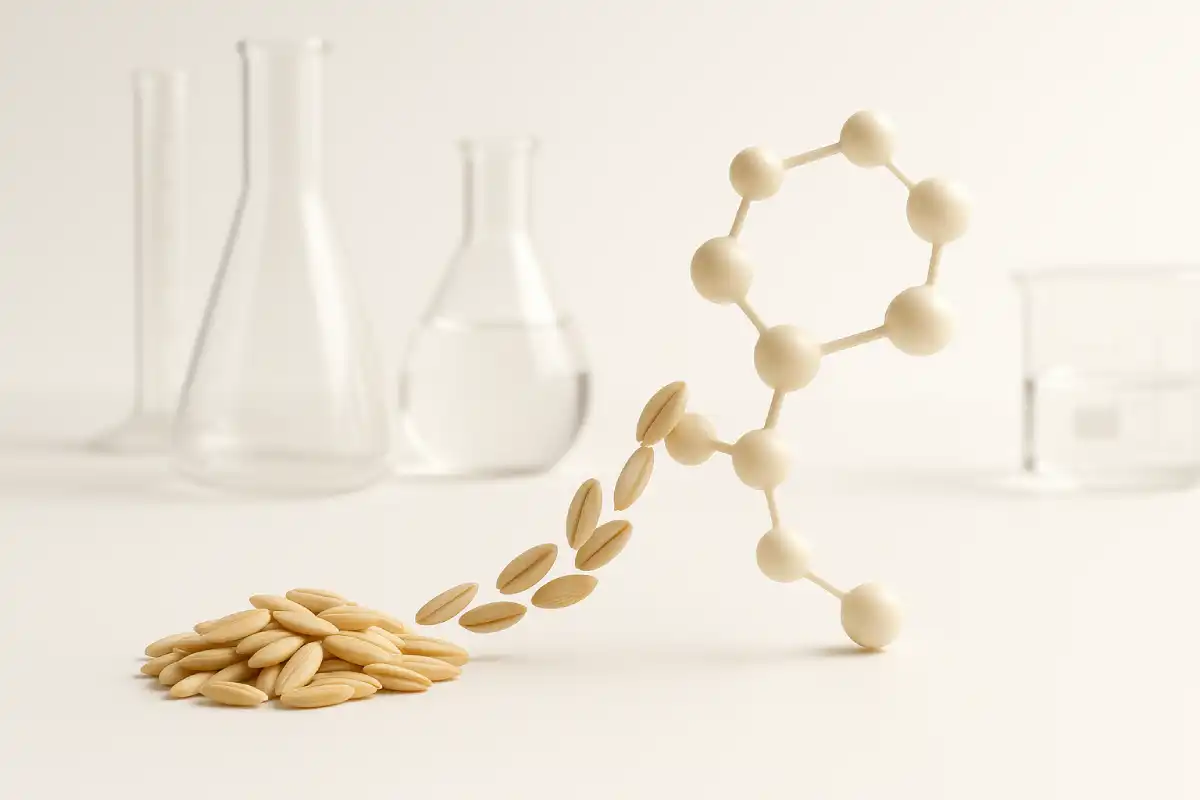The Role of Pea Peptides in Modern Plant-Based Diets
The global shift toward plant-based diets is no longer a niche trend but a structural transformation in the nutrition industry. Consumers are increasingly seeking clean-label, sustainable, and functional proteins that support not only general wellness but also specific health outcomes. In this context, pea peptides—bioactive fractions derived from enzymatic hydrolysis of pea protein—are emerging as a revolutionary ingredient in functional foods, dietary supplements, and medical nutrition products.
Unlike traditional plant proteins, pea peptides are small-molecule bioactive compounds that offer superior solubility, digestibility, and targeted health benefits. As a result, they are being rapidly adopted by B2B players in functional nutrition who seek innovative formulations for sports nutrition, metabolic health, and clinical applications.
As a full-range peptide manufacturer, China’s category standard setter, and one of the leading holders of peptide-related patents, we are proud to provide pea peptide solutions built on internationally advanced hydrolysis technology and years of expertise in the functional peptide sector.
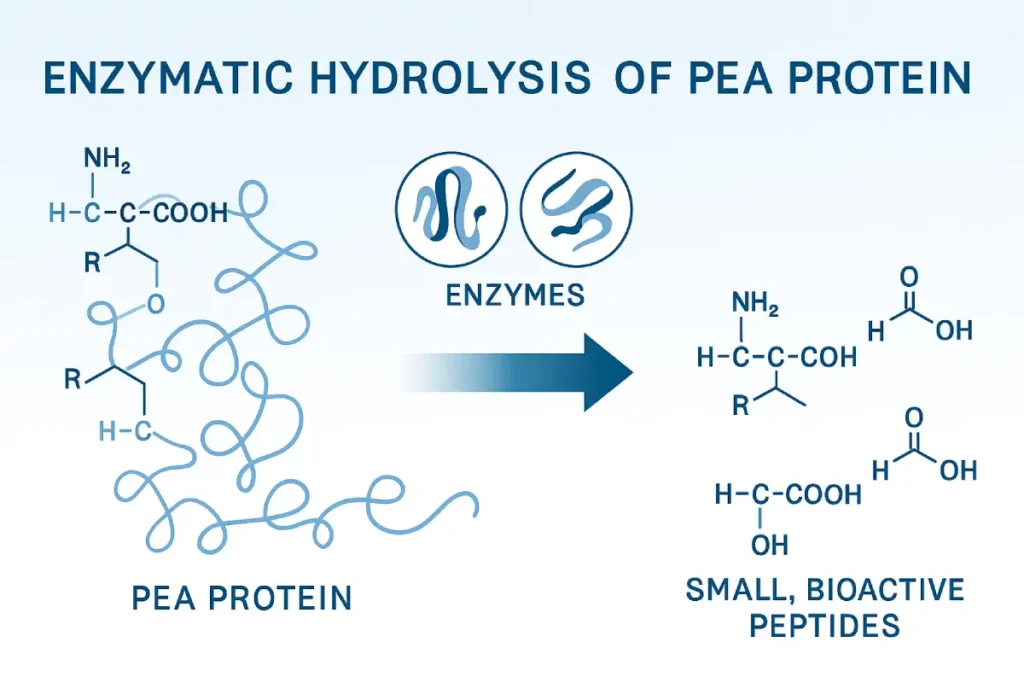
Pea Peptides vs. Traditional Plant Proteins
While pea protein has long been recognized as a valuable alternative to soy and dairy-based proteins, it faces certain limitations: relatively lower digestibility, potential bloating, and challenges in solubility. Pea peptides, however, overcome these hurdles.
Through multi-enzyme hydrolysis technology, long-chain proteins are broken down into small peptides that are more readily absorbed in the small intestine [1]. Compared to intact proteins, pea peptides demonstrate:
- Higher bioavailability → Faster absorption into the bloodstream
- Improved solubility → Suitable for beverages and instant formulations
- Reduced allergenicity → Ideal for low-allergen or hypoallergenic products
For B2B brands developing functional formulations, this makes pea peptides an attractive raw material compared with soy protein, whey protein, or other conventional protein isolates.
Functional Benefits of Pea Peptides
The bioactive nature of pea peptides allows them to deliver health benefits beyond basic nutrition. Recent research highlights multiple functional roles [2][3]:
- Muscle Health & Sports Nutrition
Pea peptides stimulate muscle protein synthesis and accelerate recovery, making them a strong contender in plant-based sports supplements. Compared with whey protein, they demonstrate comparable efficacy without dairy allergens. - Metabolic Regulation
Studies suggest pea peptides can support blood sugar control, appetite regulation, and weight management—key for metabolic health products targeted at prediabetic and obese populations. - Cardiovascular Support
Specific peptide fractions have been shown to help reduce blood pressure and improve lipid profiles [4], providing added value in heart-health formulations. - Digestive & Gut Health
With their small molecular size, pea peptides are gentle on the digestive system and can synergize with probiotics, making them suitable for sensitive consumers.
As a Chinese peptide patent leader with internationally advanced hydrolysis technology, we have developed pea peptide solutions that are specifically tailored to maximize these functional benefits.
Application in Functional Nutrition & Specialized Foods
The versatility of pea peptides makes them an ideal ingredient across multiple B2B product categories:
- Functional Foods & Dietary Supplements: Used in powders, capsules, and gummies for daily health support.
- Sports Nutrition: Incorporated into protein powders, energy bars, and recovery beverages.
- Food for Special Medical Purposes (FSMPs): Designed for patients requiring hypoallergenic, easily digestible protein sources.
- Plant-Based Beverages & Dairy Alternatives: Offering solubility and mouthfeel advantages over traditional plant proteins.
Case Studies
- Sports Nutrition Brand in Europe: A leading company incorporated our pea peptides into a plant-based protein powder. Within six months, the product ranked among the top sellers in Amazon Europe’s sports nutrition category, with sales growing over 30%.
- FSMP Application in Southeast Asia: Collaborating with a local enterprise, we developed a low-allergen infant medical formula. Clinical trials demonstrated superior digestive tolerance compared to soy-based protein formulas.
- Functional Beverage in North America: In partnership with a beverage startup, we formulated a pea peptide-based energy drink. Its high solubility and smooth taste enabled rapid entry into fitness and health retail channels.
These cases underscore how partnering with a trusted pea peptide manufacturer accelerates product innovation and market success.
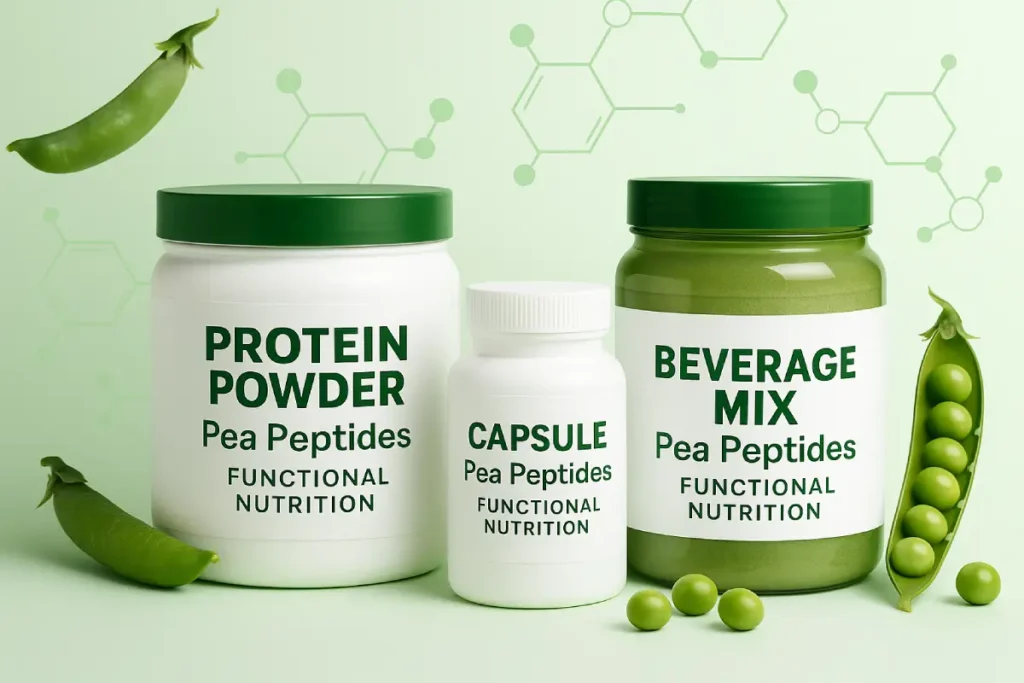
Sustainability & Market Drivers
Sustainability is a core driver of consumer preference today. Peas require relatively low agricultural inputs and nitrogen fixation, leading to a significantly lower carbon footprint compared with dairy or soy protein sources [5].
For B2B companies, sourcing sustainable protein ingredients not only meets regulatory and consumer expectations but also enhances brand positioning. By working with a peptide supplier who is also an industry standard setter, brands can simultaneously achieve sustainability, functionality, and regulatory compliance.
Manufacturing Excellence: Partnering with a Leading Peptide Manufacturer
The success of pea peptide-based products depends on manufacturing expertise. At PEPDOO®, we ensure excellence through:
- Advanced Hydrolysis Technology: Multi-enzyme synergy with precise molecular weight control.
- Quality Assurance: GMP, ISO, HACCP certifications alongside a robust patent portfolio.
- Customization Services: OEM/ODM, tailored formulations, and rapid prototyping.
- Factory Strength: As a source factory, we provide competitive pricing, stable supply, and scalability.
As a full-category peptide producer, China’s peptide industry standard setter, and one of the leading global innovators, we provide not just raw materials but also strategic partnership opportunities to help brands develop winning plant-based nutrition products.
Case Example
We partnered with a Japanese nutraceutical company to develop an OEM pea peptide formula targeted at middle-aged consumers. The product successfully entered drugstore and healthcare retail channels, with repeat orders securing a multi-year supply contract.
This illustrates how B2B brands can leverage our patent-backed expertise and international-grade production capabilities for competitive advantage.
Future Outlook: Pea Peptides in the Global Functional Market
The future of pea peptides lies at the intersection of plant-based nutrition and precision health.
- Sports Nutrition: Growing demand for dairy-free, allergen-free recovery solutions.
- Silver Economy: Pea peptides as a muscle-preserving protein for aging populations.
- Metabolic Health: Rising prevalence of diabetes and obesity creates opportunities for peptide-based solutions.
As a global peptide innovator, we are committed to shaping the next phase of functional nutrition by standardizing quality, advancing science, and delivering scalable solutions for our B2B partners.
Driving Plant-Based Nutrition with Pea Peptides: Next Steps
Pea peptides represent the protein revolution in plant-based diets, combining sustainability, superior bioavailability, and clinically relevant functional benefits. For brands in functional foods, dietary supplements, or FSMPs, integrating pea peptides offers both scientific credibility and market differentiation.
At PEPDOO®, we are more than a raw material provider—we are a trusted partner, a full-category peptide manufacturer, an industry standard setter, and a patent leader in small-molecule peptides.
Partner with a Leading Pea Peptide Manufacturer
Leverage our patented hydrolysis technology, full-range peptide portfolio, and B2B expertise to develop innovative plant-based functional foods, supplements, and FSMP products. Ensure stable supply, regulatory compliance, and market success.
Request a Sample & ConsultationFAQ
Working with a full-range peptide manufacturer ensures access to diverse peptide raw materials (plant, marine, animal sources) and customized solutions. This reduces supplier fragmentation, guarantees consistent quality, and enables innovation through patented technologies and international-grade peptide processing capabilities.
As one of China’s leading peptide manufacturers, PEPDOO® complies with both Chinese and international quality standards (ISO, HACCP, GMP). Our patented small-molecule peptide technologies and role as an industry standards setter guarantee product safety, efficacy, and traceability, which are essential for B2B formulations and bulk supply.
Yes. We have supported nutraceutical brands in Japan with soy peptide–based metabolic health products, collaborated with European functional beverage companies for marine collagen tripeptide solutions, and supplied leading U.S. supplement brands with oyster peptide formulas for men’s health. These projects demonstrate our ability to meet market-specific demands through OEM/ODM services.
We offer flexible services, including bulk raw peptide powders, ready-to-mix formulations, encapsulation, and flavor masking. B2B partners can request custom peptide blends tailored for functional foods, dietary supplements, medical nutrition, and sports performance applications.
Hydrolysis optimization maximizes peptide bioactivity, reduces bitterness, and improves solubility—key factors for consumer acceptance. For B2B buyers, this translates into better product differentiation, stronger health claims, and faster entry into competitive nutraceutical and functional food markets.
We provide flexible MOQ depending on the buyer’s needs—ranging from pilot batches for R&D projects to large-scale bulk supply for multinational brands. This flexibility allows startups and established enterprises alike to access our peptide solutions.
As a contributor to China’s peptide industry standards, PEPDOO® ensures that our technologies, formulations, and product quality remain at the forefront of global competitiveness. B2B partners gain confidence that their supply chain aligns with both national regulations and international expectations.
References
- Hall, F., Johnson, P., & Liceaga, A. (2018). Effect of enzymatic hydrolysis on bioactive properties and allergenicity of pea protein hydrolysates. Food Chemistry, 256, 163–170.
- Li, Q., et al. (2020). Pea protein hydrolysates as new functional ingredients: A review. Journal of Functional Foods, 67, 103876.
- Jakubczyk, A., Karaś, M., & Baraniak, B. (2013). Angiotensin I-converting enzyme inhibitory peptides obtained from pea protein hydrolysate. Food Chemistry, 141(1), 780–785.
- Lammi, C., Zanoni, C., Arnoldi, A., & Vistoli, G. (2015). Peptides derived from legumes as potential inhibitors of proprotein convertase subtilisin/kexin type 9 (PCSK9). Journal of Agricultural and Food Chemistry, 63(35), 8162–8169.
- Poore, J., & Nemecek, T. (2018). Reducing food’s environmental impacts through producers and consumers. Science, 360(6392), 987–992.


